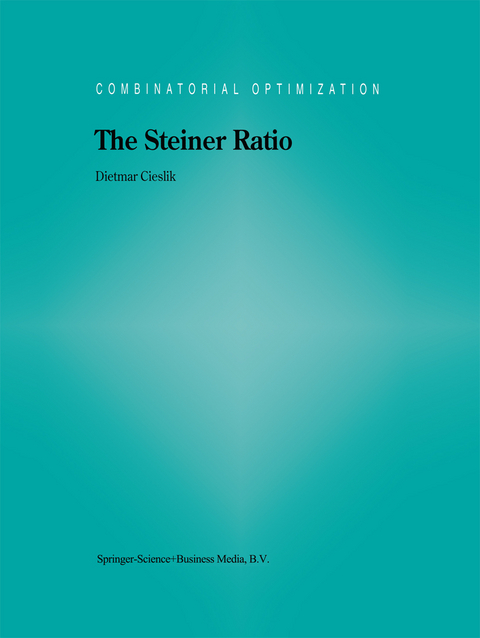
The Steiner Ratio
Seiten
2010
|
Softcover reprint of hardcover 1st ed. 2001
Springer-Verlag New York Inc.
978-1-4419-4856-4 (ISBN)
Springer-Verlag New York Inc.
978-1-4419-4856-4 (ISBN)
Steiner's Problem concerns finding a shortest interconnecting network for a finite set of points in a metric space. The worst case for this ratio running over all finite sets is called the Steiner ratio of the space.
Steiner's Problem concerns finding a shortest interconnecting network for a finite set of points in a metric space. A solution must be a tree, which is called a Steiner Minimal Tree (SMT), and may contain vertices different from the points which are to be connected. Steiner's Problem is one of the most famous combinatorial-geometrical problems, but unfortunately it is very difficult in terms of combinatorial structure as well as computational complexity. However, if only a Minimum Spanning Tree (MST) without additional vertices in the interconnecting network is sought, then it is simple to solve. So it is of interest to know what the error is if an MST is constructed instead of an SMT. The worst case for this ratio running over all finite sets is called the Steiner ratio of the space.
The book concentrates on investigating the Steiner ratio. The goal is to determine, or at least estimate, the Steiner ratio for many different metric spaces. The author shows that the description of the Steiner ratio contains many questions from geometry, optimization, and graph theory.
Audience: Researchers in network design, applied optimization, and design of algorithms.
Steiner's Problem concerns finding a shortest interconnecting network for a finite set of points in a metric space. A solution must be a tree, which is called a Steiner Minimal Tree (SMT), and may contain vertices different from the points which are to be connected. Steiner's Problem is one of the most famous combinatorial-geometrical problems, but unfortunately it is very difficult in terms of combinatorial structure as well as computational complexity. However, if only a Minimum Spanning Tree (MST) without additional vertices in the interconnecting network is sought, then it is simple to solve. So it is of interest to know what the error is if an MST is constructed instead of an SMT. The worst case for this ratio running over all finite sets is called the Steiner ratio of the space.
The book concentrates on investigating the Steiner ratio. The goal is to determine, or at least estimate, the Steiner ratio for many different metric spaces. The author shows that the description of the Steiner ratio contains many questions from geometry, optimization, and graph theory.
Audience: Researchers in network design, applied optimization, and design of algorithms.
1 The Historical Genesis.- 2 Networks, Spaces and Algorithms.- 3 Shortest Trees in Metric Spaces — A Survey.- 4 The Steiner Ratio of Metric Spaces.- 5 The Steiner Ratio of Banach-Minkowski Spaces.- 6 Euclidean Spaces.- 7 The Steiner Ratio of Neighboured Spaces.- 8 Banach-Minkowski Planes.- 9 The Steiner Ratio and the Embedding of Spaces.- 10 The Steiner Ratio and Discrete Geometry.- 11 The Dependence of the Steiner Ratio on the Dimension.- 12 Related Questions.- References.
| Erscheint lt. Verlag | 6.12.2010 |
|---|---|
| Reihe/Serie | Combinatorial Optimization ; 10 |
| Zusatzinfo | XII, 244 p. |
| Verlagsort | New York, NY |
| Sprache | englisch |
| Maße | 210 x 279 mm |
| Themenwelt | Mathematik / Informatik ► Informatik ► Theorie / Studium |
| Mathematik / Informatik ► Mathematik ► Analysis | |
| Mathematik / Informatik ► Mathematik ► Angewandte Mathematik | |
| Mathematik / Informatik ► Mathematik ► Finanz- / Wirtschaftsmathematik | |
| Mathematik / Informatik ► Mathematik ► Geometrie / Topologie | |
| ISBN-10 | 1-4419-4856-2 / 1441948562 |
| ISBN-13 | 978-1-4419-4856-4 / 9781441948564 |
| Zustand | Neuware |
| Haben Sie eine Frage zum Produkt? |
Mehr entdecken
aus dem Bereich
aus dem Bereich
was jeder über Informatik wissen sollte
Buch | Softcover (2024)
Springer Vieweg (Verlag)
37,99 €
Grundlagen – Anwendungen – Perspektiven
Buch | Softcover (2022)
Springer Vieweg (Verlag)
34,99 €
Eine Einführung in die Systemtheorie
Buch | Softcover (2022)
UTB (Verlag)
25,00 €


